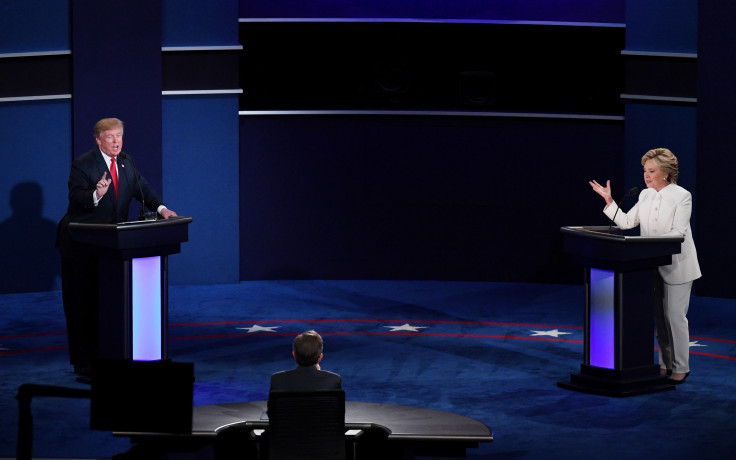Presidential Debate Video Highlights: Best Moments, Quotes, Insults And Answers From The Trump, Clinton Showdown

The final presidential debate Wednesday night saw a contentious showdown between Democratic nominee Hillary Clinton and Republican Donald Trump. The two candidates started out somewhat reserved, but the jabs increased as the event went on.
The first question of the night addressed the Supreme Court. Clinton said the court needs to stand up for LGBT and women's rights. She said she hoped President Barack Obama's nominee, Merrick Garland, would be confirmed in the Senate. Trump countered that he would appoint conservative justices who respect the Second Amendment and touted his National Rifle Association endorsement.
.@realDonaldTrump on his NRA endorsement: “I’m very proud" pic.twitter.com/fylMgXp2yO
— POLITICO (@politico) October 20, 2016
The candidates disagreed on abortion laws. Trump said Clinton's pro-abortion policies would allow fetuses to be "ripped from the womb" at nine months, a claim Clinton called an unfortunate "scare" tactic.
.@realDonaldTrump and @HillaryClinton spar on abortion. Clinton to Trump: “Using that kind of scare rhetoric is terribly unfortunate" pic.twitter.com/NElg9x1NZe
— POLITICO (@politico) October 20, 2016
Trump on abortion: "With what Hillary is saying, in the ninth month, you can take the baby and rip the baby out of the womb of the mother" pic.twitter.com/FF8rQWWtSl
— NBC News (@NBCNews) October 20, 2016
Trump defended his proposed border wall, noting the U.S. has some "bad hombres" who need to get out. Clinton claimed Trump "choked" in his meeting with the Mexican president this summer, since he didn't bring up the wall he said he will build.
.@HillaryClinton says @realDonaldTrump went to Mexico and “choked” on his Mexico wall plan pic.twitter.com/GEyrmF4beo
— POLITICO (@politico) October 20, 2016
.@realDonaldTrump: “We have some bad hombres here and we’re going to get them out” pic.twitter.com/qMB4XWKLAK
— POLITICO (@politico) October 20, 2016
Clinton at another point called Trump a puppet for Russian President Vladimir Putin. Trump answered: "You're the puppet."
.@realDonaldTrump, responding to Clinton's Putin puppet remark: "No, you're the puppet" pic.twitter.com/MA5wKL3gne
— POLITICO (@politico) October 20, 2016
Amid allegations that Trump sexually assaulted women, Clinton said the GOP nominee pumps himself up by attacking women.
Trump blames Clinton for sexual assault accusations: I believe "she got these people to step forward" #Debatenight https://t.co/pA9ZYUrzpd
— CNN (@CNN) October 20, 2016
Clinton: "Donald thinks belittling women makes him bigger." #DebateNight #Decision2016 https://t.co/LvjQQgs8YF
— NBC News (@NBCNews) October 20, 2016
Trump brought up trade deals, which has proven a good line of attack for him, and said Clinton called the Trans-Pacific Partnership the gold standard.
Trump: NAFTA "was one of the worst things that's ever been signed by our country" https://t.co/bOAvsxqnwA #Debate https://t.co/xJhwHl1aG4
— CNN (@CNN) October 20, 2016
Both Clinton and Trump have charity foundations that have been subjected to careful analysis. Clinton said Trump may have used charity money to buy a painting of himself.
Clinton: Trump Foundation "took money from other people and bought a six-foot portrait of Donald ... Who does that?" https://t.co/FDOzNu3h3i
— CNN (@CNN) October 20, 2016
Trump has spent much of the past week saying the election was rigged against him and on debate night he said he might not accept the results of the vote on Nov. 8.
Trump on whether he will accept election results: "I will look at it at the time." #DebateNight #Decision2016 https://t.co/oORIIpRPzn
— NBC News (@NBCNews) October 20, 2016
Trump needed a strong performance during the debate to get to the White House. The Real Clear Politics average of polls showed Clinton up by 6.2 percentage points nationally in a four-way race. Most polling firms had Clinton's national lead between three and seven percentage points, although surveys from Rasmussen Reports and IBD/TIPP showed an effectively tied race.
Trump had ground to make up at the state level, as well. The Real Clear Politics averages showed Clinton led by 3.6 percentage points in Florida and by 2.5 percentage points in North Carolina, states that are must-wins for Trump if he is to reach the 270 electoral votes needed to win on Nov. 8. Heading into the event, data-driven website FiveThirtyEight gave Clinton an about 86 percent chance of winning in its polls-based election forecast.
The first two debates proved to hurt Trump's standings with voters. Polls showed he lost the first debate and, despite being extremely aggressive and provocative during the beginning of the second showdown, he again failed to gain ground in the second debate.
Prior to the third debate, Trump had taken an even more aggressive approach to the campaign, railing against what he called a "rigged" election. He claimed Clinton, government elites and the media were conspiring to keep him out of the White House.
© Copyright IBTimes 2024. All rights reserved.






















